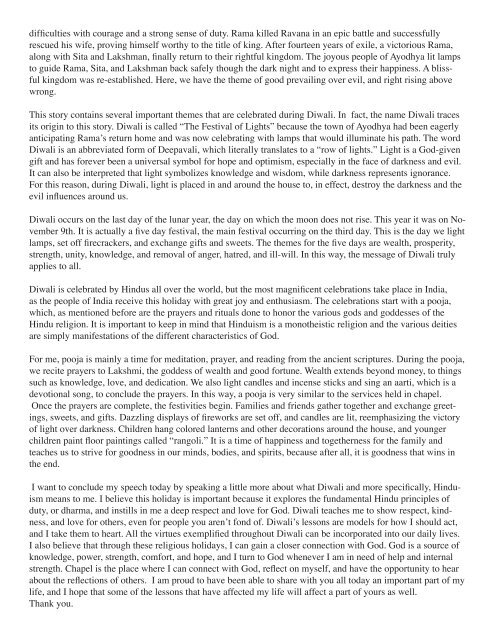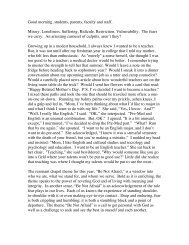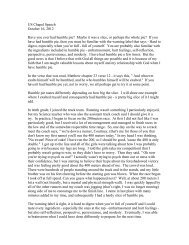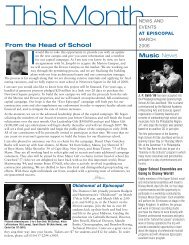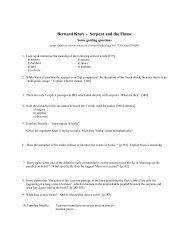Rohan Gulati Diwali Speech - Episcopal Academy
Rohan Gulati Diwali Speech - Episcopal Academy
Rohan Gulati Diwali Speech - Episcopal Academy
You also want an ePaper? Increase the reach of your titles
YUMPU automatically turns print PDFs into web optimized ePapers that Google loves.
difficulties with courage and a strong sense of duty. Rama killed Ravana in an epic battle and successfullyrescued his wife, proving himself worthy to the title of king. After fourteen years of exile, a victorious Rama,along with Sita and Lakshman, finally return to their rightful kingdom. The joyous people of Ayodhya lit lampsto guide Rama, Sita, and Lakshman back safely though the dark night and to express their happiness. A blissfulkingdom was re-established. Here, we have the theme of good prevailing over evil, and right rising abovewrong.This story contains several important themes that are celebrated during <strong>Diwali</strong>. In fact, the name <strong>Diwali</strong> tracesits origin to this story. <strong>Diwali</strong> is called “The Festival of Lights” because the town of Ayodhya had been eagerlyanticipating Rama’s return home and was now celebrating with lamps that would illuminate his path. The word<strong>Diwali</strong> is an abbreviated form of Deepavali, which literally translates to a “row of lights.” Light is a God-givengift and has forever been a universal symbol for hope and optimism, especially in the face of darkness and evil.It can also be interpreted that light symbolizes knowledge and wisdom, while darkness represents ignorance.For this reason, during <strong>Diwali</strong>, light is placed in and around the house to, in effect, destroy the darkness and theevil influences around us.<strong>Diwali</strong> occurs on the last day of the lunar year, the day on which the moon does not rise. This year it was on November9th. It is actually a five day festival, the main festival occurring on the third day. This is the day we lightlamps, set off firecrackers, and exchange gifts and sweets. The themes for the five days are wealth, prosperity,strength, unity, knowledge, and removal of anger, hatred, and ill-will. In this way, the message of <strong>Diwali</strong> trulyapplies to all.<strong>Diwali</strong> is celebrated by Hindus all over the world, but the most magnificent celebrations take place in India,as the people of India receive this holiday with great joy and enthusiasm. The celebrations start with a pooja,which, as mentioned before are the prayers and rituals done to honor the various gods and goddesses of theHindu religion. It is important to keep in mind that Hinduism is a monotheistic religion and the various deitiesare simply manifestations of the different characteristics of God.For me, pooja is mainly a time for meditation, prayer, and reading from the ancient scriptures. During the pooja,we recite prayers to Lakshmi, the goddess of wealth and good fortune. Wealth extends beyond money, to thingssuch as knowledge, love, and dedication. We also light candles and incense sticks and sing an aarti, which is adevotional song, to conclude the prayers. In this way, a pooja is very similar to the services held in chapel.Once the prayers are complete, the festivities begin. Families and friends gather together and exchange greetings,sweets, and gifts. Dazzling displays of fireworks are set off, and candles are lit, reemphasizing the victoryof light over darkness. Children hang colored lanterns and other decorations around the house, and youngerchildren paint floor paintings called “rangoli.” It is a time of happiness and togetherness for the family andteaches us to strive for goodness in our minds, bodies, and spirits, because after all, it is goodness that wins inthe end.I want to conclude my speech today by speaking a little more about what <strong>Diwali</strong> and more specifically, Hinduismmeans to me. I believe this holiday is important because it explores the fundamental Hindu principles ofduty, or dharma, and instills in me a deep respect and love for God. <strong>Diwali</strong> teaches me to show respect, kindness,and love for others, even for people you aren’t fond of. <strong>Diwali</strong>’s lessons are models for how I should act,and I take them to heart. All the virtues exemplified throughout <strong>Diwali</strong> can be incorporated into our daily lives.I also believe that through these religious holidays, I can gain a closer connection with God. God is a source ofknowledge, power, strength, comfort, and hope, and I turn to God whenever I am in need of help and internalstrength. Chapel is the place where I can connect with God, reflect on myself, and have the opportunity to hearabout the reflections of others. I am proud to have been able to share with you all today an important part of mylife, and I hope that some of the lessons that have affected my life will affect a part of yours as well.Thank you.


